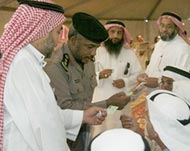Conservatives sweep Saudi polls
Candidates on a “golden list” backed by conservative clerics have swept the final stage of Saudi Arabia’s landmark municipal elections, according to results announced Saturday.

Losing candidates immediately challenged the results of Thursday’s balloting, the last of three stages of nationwide municipal elections that began in February.
“This is not democracy or equal opportunity,” said Nabil Qamlu, a Jiddah lawyer who lost to one of the candidates on the “golden list.” “Next elections I will have to grow beard in order to get elected.”
Beards are seen as a sign of a committed Muslim in this religious society.
Whether the results were an indication of popular support or the result of rule-bending clerical involvement, the Saudi monarchy will now need to decide how much influence to permit the Islamists. The government still controls the councils, appointing half their members.
Clerics’ picks
Many of the losing candidates alleged that the names of certain candidates were circulated on what was dubbed the “golden list” chosen by conservative clerics, a move they said violated an electoral law forbidding the forming of coalitions. The winners also unfairly claimed they had religious backing, disgruntled candidates said.
 |
|
A Saudi security officer explains |
Bassam Jamil al-Khadher, one of the winners in Jiddah, a Red Sea port city known as one of the more liberal parts of the kingdom, denied there was any coordination or formal list.
However, a list of names was widely circulated on the Internet and through mobile text messages.
“Of course, our respected scholars supported us,” al-Khadher said of the conservative religious candidates. “We are people known for our public service. It is only natural that we will get such support. We are an Islamic country and we are Islamists.”
Popular choice
Abdel-Rahman al-Yamani, who secured the most votes in Jiddah – nearly 12,000 of the 55,000 cast in the municipality – attributed the Islamists’ success to popular support rather than an organized clerical campaign.
“We are religious people by nature and secular people are not accepted by the society,” he said.
The seven winning candidates in Jiddah all appeared on the “golden list.” In Makka, the birthplace of Islam, seven candidates endorsed by the clergy also won. Five of the six winners in Buraydah, capital of ultraconservative Qaseem province, had been given a clerical nod, and Islamists in the holy city of Medina also had a strong showing.
Government appointees
Many Islamists also won seats in February and March municipal council polling elsewhere in the kingdom. Though they will have significant sway on local political matters, the government can balance the councils by naming liberals to the half of all council seats reserved for government appointees.
“This proves that it was an enforced choice, predetermined, but if that was the choice of the people, we respect it,” said Osama Jamjoom, who lost in the Jiddah race.
He did not plan to lodge a complaint. “This is a waste of time,” he said.
In Makka, losing candidate Ibrahim bin Hussein accused the government of turning a blind eye to the clerics’ endorsements.
“It wasn’t arbitrary of a matter of chance, it was a well-orchestrated and planned campaign,” he said. “When you tell people this candidate is good and pious, it means you also tell them that his opponent is not. This highly matters in a religious society.”
Complaints
Many losing candidates said they will lodge complaints with the election commission against what they described as interference in the elections by the clergy. Previous complaints were largely ignored by the commission.
Municipal council posts have little power, but many Saudis jumped at the chance to have even a small voice in politics.
Religious minorities such as Shias and Sufis had hoped the elections would give them a chance to assert their rights in a country where the official school of Sunni Islam considers them heretics.
The Saudi monarchy, a longtime ally of Washington, has been under US pressure to make democratic reforms. But the limited experiment in democracy – only men could vote and run for seats on the half-appointed councils – also appeared an attempt to deflate the militant Islamic movement by bringing some Islamists into the system.
Thursday’s voting was the last of three rounds to elect roughly half of the 1200 local council members. In this phase, a total of 244 seats were up for grabs in Makka as well as the northern areas of Hail, Tabuk and Jouf on the northern frontier with Iraq and Jordan.